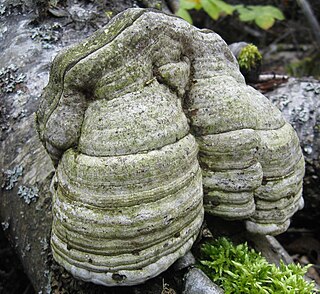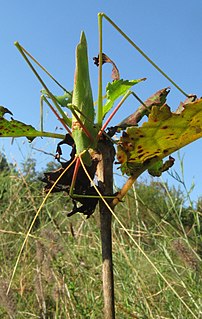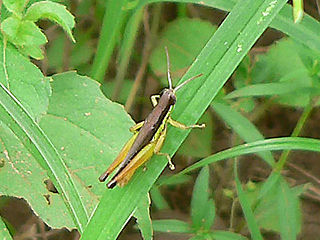| Hypocrella | |
|---|---|
 | |
| Scientific classification | |
| Kingdom: | Fungi |
| Division: | Ascomycota |
| Class: | Sordariomycetes |
| Order: | Hypocreales |
| Family: | Clavicipitaceae |
| Genus: | Hypocrella Sacc., 1878 |
Hypocrella [1] is a genus of fungi in the family Clavicipitaceae. [2]
| Hypocrella | |
|---|---|
 | |
| Scientific classification | |
| Kingdom: | Fungi |
| Division: | Ascomycota |
| Class: | Sordariomycetes |
| Order: | Hypocreales |
| Family: | Clavicipitaceae |
| Genus: | Hypocrella Sacc., 1878 |
Hypocrella [1] is a genus of fungi in the family Clavicipitaceae. [2]
The Catalogue of Life lists: [2]
Tauchira is a genus of grasshoppers in the subfamily Catantopinae and tribe Tauchirini. Species can be found in South-East Asia.

The Clavicipitaceae are a family of fungi within the order Hypocreales. A 2008 estimate placed 43 genera in the family, but recent work has increased this number to 97.

Fomes is a genus of perennial woody fungi in the family Polyporaceae. Species are typically hoof-shaped (ungulate). New growth each season is added to the margin, resulting in a downward extension of the hymenium. This often results in a zonate appearance of the upper surface, that is, marked by concentric bands of color.

Lentinus is a genus of fungi in the family Polyporaceae. The genus is widely distributed, with many species found in subtropical regions.

Job Bicknell Ellis was a pioneering North American mycologist known for his study of the Ascomycetes, especially the grouping of fungi called the Pyrenomycetes. Born and raised in New York, he worked as a teacher and farmer before developing an interest in mycology. He collected specimens extensively, and together with his wife, prepared 200,000 sets of dried fungal samples that were sent out to subscribers in series between 1878 and 1894. Together with colleagues William A. Kellerman and Benjamin Matlack Everhart, he founded the Journal of Mycology in 1885, forerunner to the modern journal Mycologia. He described over 4000 species of fungi, and his collection of over 100,000 specimens is currently housed at the herbarium of the New York Botanical Gardens. Ellis had over 100 taxa of fungi named in his honor.

Isaria is a genus of fungi mostly in the order Hypocreales and family Clavicipitaceae, or by some authorities the Cordycipitaceae. It includes a large number of entomopathogenic species, some of them exploited as biopesticides : often previously assigned to the genus Paecilomyces.

The Trigonopterygoidea are an insect superfamily in the Orthoptera: Caelifera. Sometimes described as leaf grasshoppers, American species in the Xyronotidae have also been called razor-backed bush-hoppers.

The Trigonopterygidae are an insect family in the Orthoptera: Caelifera found in south and south-east Asia.

Acrometopa is a genus of bush crickets in the subfamily Phaneropterinae. Species in this genus are found in Europe and the Middle East.
Himertula is a genus of bush cricket in the subfamily Phaneropterinae and tribe Letanini. Species can be found mostly in the Indian sub-continent.
Letana is a genus of bush cricket: characteristic of the tribe Letanini and placed in the subfamily Phaneropterinae. Species can be found in Asia: mostly India, China and Indo-China.
Scambophyllum is a genus of bush cricket in the subfamily Phaneropterinae. Species can be found mostly in Indo-China and Malesia.

Caedicia is a genus of bush crickets or katydids in the subfamily Phaneropterinae. Species can be found Australasia, with records from Vietnam, Papua New Guinea, and Australia.
Nomuraea is a genus of fungi in the family Clavicipitaceae.
Metarhizium rileyi is a species of entomopathogenic fungus in the family Clavicipitaceae; there is extensive literature under its synonym Nomuraea rileyi.
Costantinella is a genus of anamorphic fungi in the family Morchellaceae and class Pezizomycetes

Spathosternum is a genus of grasshoppers in the family Acrididae: subfamily Spathosterninae, with species found in Africa, including Madagascar and tropical Asia.
Aschersonia is a genus of fungi in the order Hypocreales and family Clavicipitaceae.

Ducetia is the type genus of the Ducetiini: a tribe of Asian bush crickets.
Isopsera is an Asian genus of bush crickets in the subfamily Phaneropterinae. Species can be found in India, Indochina, Malesia and the Pacific Islands.